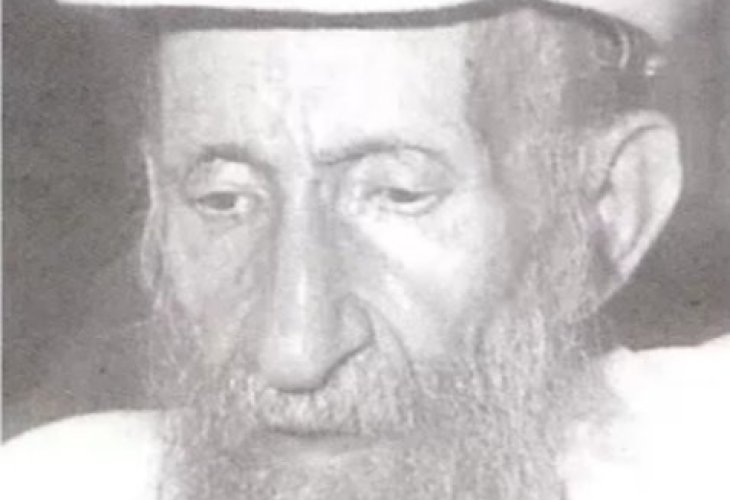Torah Personalities
The Hidden Saint of Jerusalem: Remembering the Late Rabbi Salman Mutzafi
From midnight tears to hidden fasts, Rabbi Mutzafi's life was a silent storm of holiness that uplifted a nation
 Rabbi Salman Mutzafi
Rabbi Salman MutzafiA Life of Holiness, Simplicity, and Strength
Rabbi Salman Mutzafi lived a life shaped by awe of Hashem, uncompromising integrity, and profound humility. He never sought favor or flattery, took nothing from others (not even from family), and supported himself solely through his own labor. Every moment was sacred to him. He avoided idle talk and was immersed in Torah study day and night, even while suffering on his deathbed. Despite illness and pain, he was always cheerful. When asked how he felt, he would reply, “Thank God, I feel well.” He rejoiced in what he had, raised his children with great devotion, honored Torah scholars wholeheartedly, and treated the synagogue with the utmost reverence.
He was meticulous in observing the laws of Shabbat. All food was fully cooked before Shabbat, and only rice and stuffed chicken were reheated on a flame that was prepared in accordance with halacha (Jewish law). He refrained from using electricity generated by Jews on Shabbat. By Friday afternoon, he was already dressed in white Shabbat clothes and could be found learning in the synagogue for hours until Minchah (the afternoon prayer). He delighted in Shabbat, singing joyfully and sharing Torah insights.
Uncompromising Care in Mitzvot and Kashrut
During Pesach, nothing from outside entered his home. He personally planted the wheat used for his matzah, and made his own wine and oil. He trusted no one’s supervision. He avoided all preserved products, relying only on items he had prepared himself during the summer, meticulously and with care.
He rose at midnight each night to lament the Temple’s destruction, the Shechinah (Divine Presence), and the exile of the Jewish people. He wept over the pain of both individuals and the nation. He loved every Jew as himself and never benefited from the Torah’s honor. He practiced asceticism. He ate little, slept little, and fasted frequently. On Monday and Friday nights, he stayed awake all night learning Torah with close companions.
He loved charity, kindness, and ethical conduct. He fled from honor and fame, living with the deepest humility. He prayed each day at sunrise with joy, ran to every prayer service, and immersed in the mikveh (ritual bath) with incredible speed, even in his old age. On weeknights, he didn’t return home but slept in a small room near the synagogue. He never ate a meal outside his own home. Every moment was precious. He was extraordinarily careful not to steal, even inadvertently. He never delayed payment, whether for wages or a small purchase. If he hadn’t paid immediately, he would return that same day to settle the debt.
He managed charity funds with absolute integrity and accounted for every last coin. Each night, he personally counted the money and reviewed all records.
A Lion in Mitzvah Observance, A Shadow in Public
Each year, Rabbi Mutzafi traveled with his students to hidden graves of tzaddikim in the Galilee, where he prayed passionately for the Jewish people and cried over the exile and the secular nature of the state’s leadership. He avoided all association with government or political power. Even as a father of ten, he refused a single penny from the National Insurance Institute. He turned down all government stipends, including pensions, and lived in great material hardship, always joyful, always content.
He fulfilled mitzvot (Divine commandments) with tenacity: leket, shikhecha, pe’ah (gifts for the poor), returning lost objects, shiluach haken (sending away the mother bird), and even rare commandments like pidyon peter chamor (redeeming a firstborn donkey), reishit hagez (first shearing), and the priestly gifts. He was meticulous in separating terumot and maasrot (tithes) by hand and relied on no one else’s supervision. He observed shemittah (the sabbatical year) in all its details.
A man of truth and sincerity, Rabbi Mutzafi concealed his spiritual greatness in utter modesty. He never sought honor, never publicized his deeds, and refused compensation for his spiritual work.
A Hidden Tzaddik for the Entire Nation
He prayed for the Jewish people as a whole and for every individual in need his entire life. He practiced extraordinary chasidut (piety), observing mitzvot with precision, crying bitterly each midnight over the exile and destruction. He immersed himself in kabbalah, praying according to the mystical intentions of the Rashash (Rabbi Shalom Sharabi) to hasten redemption. He did all of this in secret, far from the public eye.
He never lived off the Torah, never took a penny he didn’t earn himself, and remained immersed in humility. He performed public atonements on behalf of the people, such as fasts, self-affliction, icy immersions, symbolic lashes, and even the ritual reenactment of the four capital punishments listed in the Torah. His spiritual discipline resembled that of angels.

